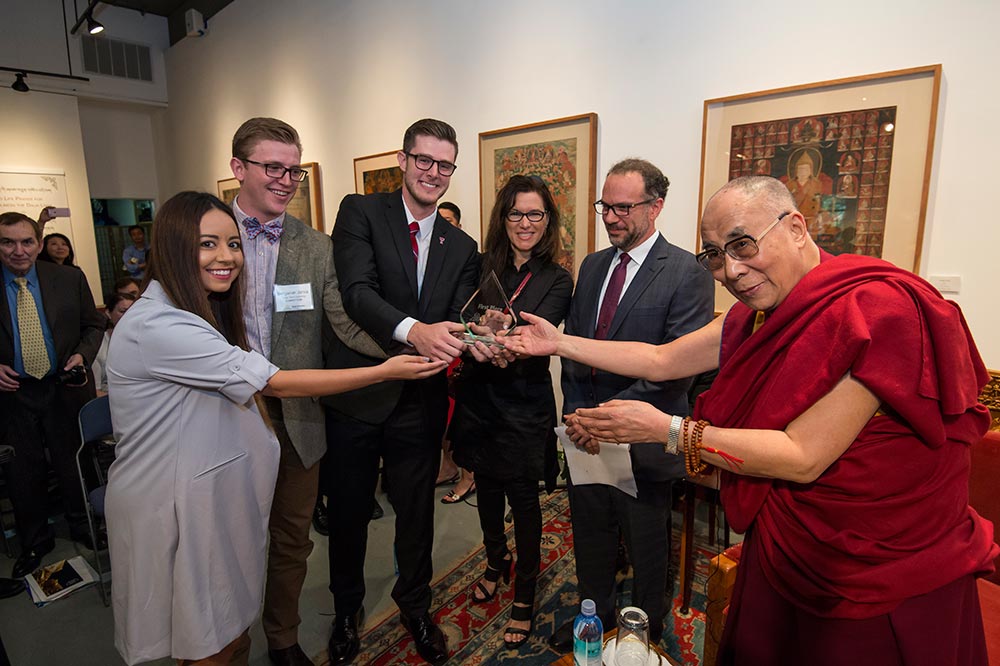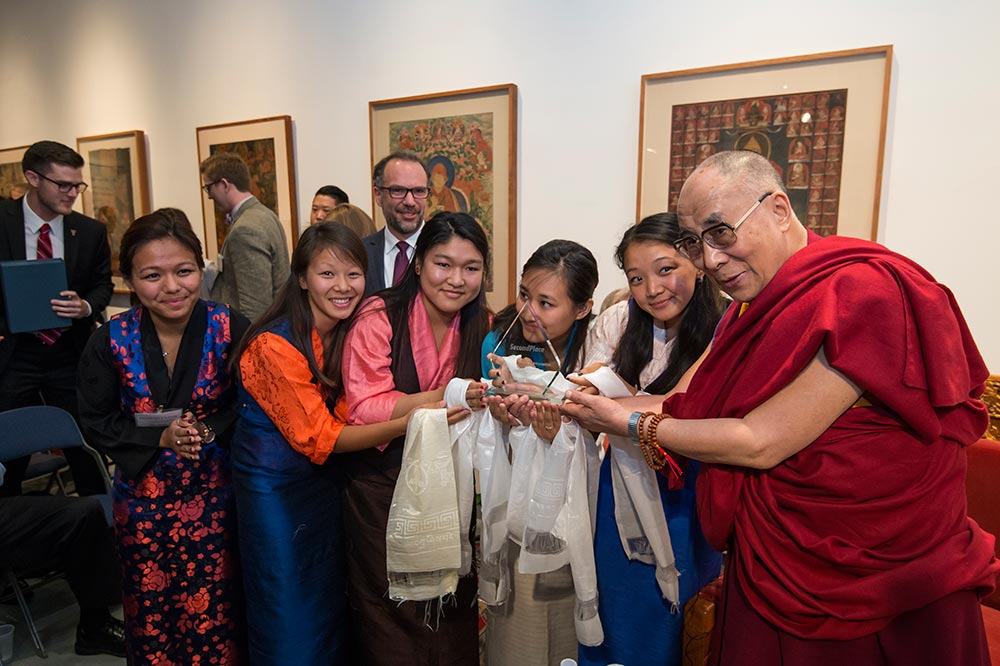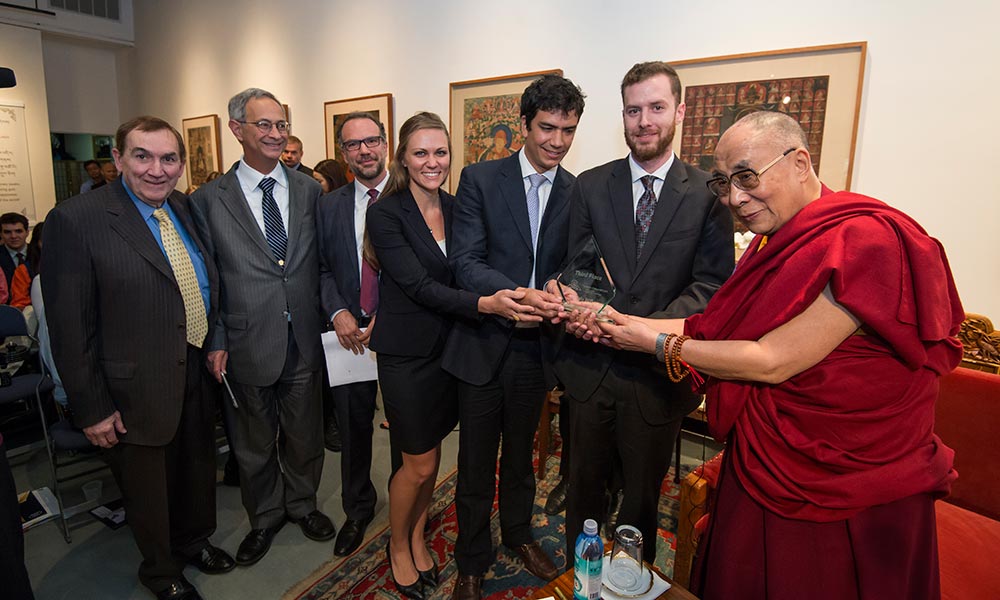Five students from Texas Tech University were awarded first place and $5,000 at the inaugural Tibetan Innovation Challenge during an award ceremony with the Dalai Lama at the Tibet House US in New York City on Saturday morning. The Challenge is a new intercollegiate social entrepreneurship business plan competition, organized by the University of Rochester and created to improve the lives of 125,000 Tibetan refugees through self-sustaining and replicable business ideas.
The Texas Tech students won for their business idea PATA, an online point-of-sales system that allows Tibetan handicraft producers to target western consumers.

Texas Tech team members not pictured: Tailor Brown, 22, Carlsbad, N.M. and Saba Nafees, 23, Fort Worth, Texas.
A team of six students representing Syracuse University and including one student from the Rochester Institute of Technology won second place and $2,500 for their business idea tsampa- A Taste of Tibet is a nutrition bar produced by Tibetan refugees in India and sold in the United States.

Team member not pictured: Rinchen Namgyal, 26, Dharamshala, India, of the Rochester Institute of Technology.
Three Simon Business School students from the University of Rochester placed third for their business idea Tibetan Microfinance, which aims to unlock the entrepreneurial potential of Tibetans living in India by bringing them basic financial training and access to capital.

The other finalists included teams from Case Western Reserve University, the University of California, Los Angeles, and the University of Maryland.
The six teams presented their ideas to a panel of judges at the Tibet House US last night. Judges included Jeff Hoffman, a successful serial entrepreneur who has been part of the founding teams for companies such as Priceline.com and uBid.com; Lobsang Nyandak, executive director of the Tibet Fund and trustee to H.H. the Dalai Lama; Song Pak, senior vice president of operations and acting general counsel for Revolution LLC, and general counsel and chief compliance officer for Revolution Growth; and Thubten Samdup, former representative of H.H. the Dalai Lama to Northern Europe.
The teams presented the following ideas:
- First place – Texas Tech University: PATA will revitalize the handicraft market by providing an online point-of-sales system that allows handicraft producers to target western countries.
- Second place – Syracuse University: tsampa- A Taste of Tibet is a nutrition bar produced by Tibetan refugees in India and sold in the U.S.
- Third place – University of Rochester: Tibetan Microfinance will unlock the entrepreneurial potential of Tibetans living in India by bringing them basic financial training and access to capital.
- Finalist – Case Western Reserve University: Provide Internet cafes powered by solar energy and Tesla-powered wall batteries.
- Finalist – University of California, Los Angeles: Khata Studios will produce and distribute podcasts, targeted at young Tibetans, with programming designed to develop interest in their culture and motivate economic development.
- Finalist – University of Maryland: To offer a three-part curriculum — “Enlighten,” “Enrich” and “Engage”— that teaches entrepreneurship to students in the Tibetan Children’s Village school system.
“The Tibetan Innovation Challenge seeks to match the best business ideas from talented students from some of the top business schools in the U.S. with a select group of Tibetan entrepreneurs,” said Kaydor Aukatsang, representative of His Holiness the Dalai Lama to North America. “And those entrepreneurs will put the ideas into action to both place themselves and the Tibetan refugee community in India on a path of self-reliance and economic freedom.”
Tibetan refugees will have access to all of the business plans submitted, not just the advancing or winning ideas, in addition to seed funding earmarked by the Dalai Lama to implement the business models. The University of Rochester coordinated the competition in partnership with The Art of Peace Foundation, the Tibet House Trust in London, the Tibetan Entrepreneurship Development (TED) initiative, and the Tibet House US. For more information, visit www.rochester.edu/tibetchallenge/champions.
About the University of Rochester Center for Entrepreneurship
The University of Rochester Center for Entrepreneurship, launched by a grant from the Ewing Marion Kauffman Foundation grant awarded to the University in 2003, provides the University and greater Rochester communities with resources to generate and transform ideas into enterprises that create economic or social value. More information about the Center is available at www.rochester.edu/entrepreneurship.
About The Art of Peace Foundation
The Art of Peace Foundation is a 501(c)(3) non-profit founded on the Dalai Lama’s belief of “Universal Responsibility.” Regardless of nation, culture or religion, skillful compassionate actions can reduce suffering and promote happiness. The Dalai Lama has expressed deep concern over a trend of young Tibetans forced to leave their communities in search of gainful employment. The Art of Peace Foundation’s executive director and Associate Director of Social Entrepreneurship at the University of Rochester, Michael Wohl, established the intercollegiate Tibetan Innovation Challenge competition to engage entrepreneurial-minded students to develop sustainable businesses for Tibetan refugees. The Art of Peace Foundation is funding the first place award. With artists like Sting, John Mayer, Dave Matthews, Peter Gabriel, etc., the Art of Peace Foundation has also produced albums to support Tibetan culture.
About the Tibet House Trust
Tibet House Trust is auk registered charity, inaugurated in 1994 by His Holiness the Dalai Lama, the patron of the Trust. Its purpose is to preserve the distinct Tibetan culture and identity, and enable the Tibetans to attain a sustainable life in exile while working for an eventual return to their homeland. Since its inception, the Tibet House Trust has worked closely with the various departments of the Central Tibetan Administration on a number of projects for health, educational, cultural, economic and community development needs of the refugee community. Funding for the Trust projects is raised from individual donations, NGOs, European Commission, Comic Relief and Big Lottery Fund, etc. The Tibet House Trust will continue to focus its efforts on strengthening the exile community, for it is here that Tibetan culture and national identity are being sustained.
About the Tibetan Entrepreneurship Development (TED)
Tibetan Entrepreneurship Development (TED), an initiative of the Social and Resource Development Fund (SARD), aims to be an agent of change in helping orient Tibetan entrepreneurs and businesses towards becoming competitive, sustainable and impact-oriented. At present, most Tibetan entrepreneurs are involved in livelihood businesses with little competitive, innovative and growth-oriented mindset. TED plans to bring in changes to this laid-back attitude of doing business by nurturing innovative ideas and an ecosystem to address the various impediments that today’s aspiring entrepreneurs are facing. We hope through this initiative, we will be able to create many successful and competitive entrepreneurs who will act as role models for other aspiring youths to emulate and thus, help instill an entrepreneurial culture within the community which will ultimately contribute to the community’s economic well-being.
About the Tibet House US
Tibet House US was founded at the request of His Holiness the Dalai Lama, who at his inauguration in 1987 stated his wish for a long-term cultural institution to ensure the survival of Tibetan civilization and culture, whatever the political destiny of the six million people of Tibet itself. Tibet House US is dedicated to preserving Tibet’s unique culture at a time when it is confronted with extinction on its own soil. By presenting Tibetan civilization and its profound wisdom, beauty, and special art of freedom to the people of the world, we hope to inspire others to join the effort to protect and save it. Tibet House US is part of a worldwide network of Tibetan institutions committed to ensuring that the light of the Tibetan spirit never disappears from the face of this earth.




